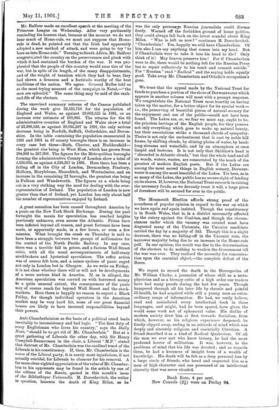Anti-Cbamberlainism as the basis of a political creed leads inevitably
to inconsistency and bad logic. "The first duty of every Englishman who loves his country," says the Daily News, "should be to get rid of Mr. Chamberlain." But at a great gathering of Liberals the other day, with Sir Henry Campbell-Bannerman in the chair, a Liberal " M.P." stated that distrust of Mr. Chamberlain was the caidinal tenet of the Liberals in his constituency. If, then, Mr. Chamberlain is the nexus of the Liberal party, it is surely most injudicious, if not actually suicidal, for Liberals to clamour for his removal. A far more clear-sighted appreciation of the value of Mr. Chamber. lain to his opponents may be found in the article by one of the editors of the Ronda, quoted in this month's issue of the Bibliotlaque Universelle. M. Dorochevitch, the writer in question, laments the death of King Milan, as he was the only personage Russian journalists could discuss freely. Warned off the forbidden ground of home politics, they could always fall back on the latest scandal about King Milan. "Who is left us now ? " continues M. Dorochevitch. " Chamberlain ! Yes, happily we still have Chamberlain. Of him also I can say anything that comes into my head. But if Chamberlain were to take it into his head to die ? Only think of it! May heaven preserve him ! For if Chamberlain were to die, there would be nothing left for the Russian Press but to repair collectively to his tomb and commit suicide." For " Russian " read " Radical " and the saying holds equally good. Take away Mr. Chamberlain and Othello's occupation's gone.






































 Previous page
Previous page